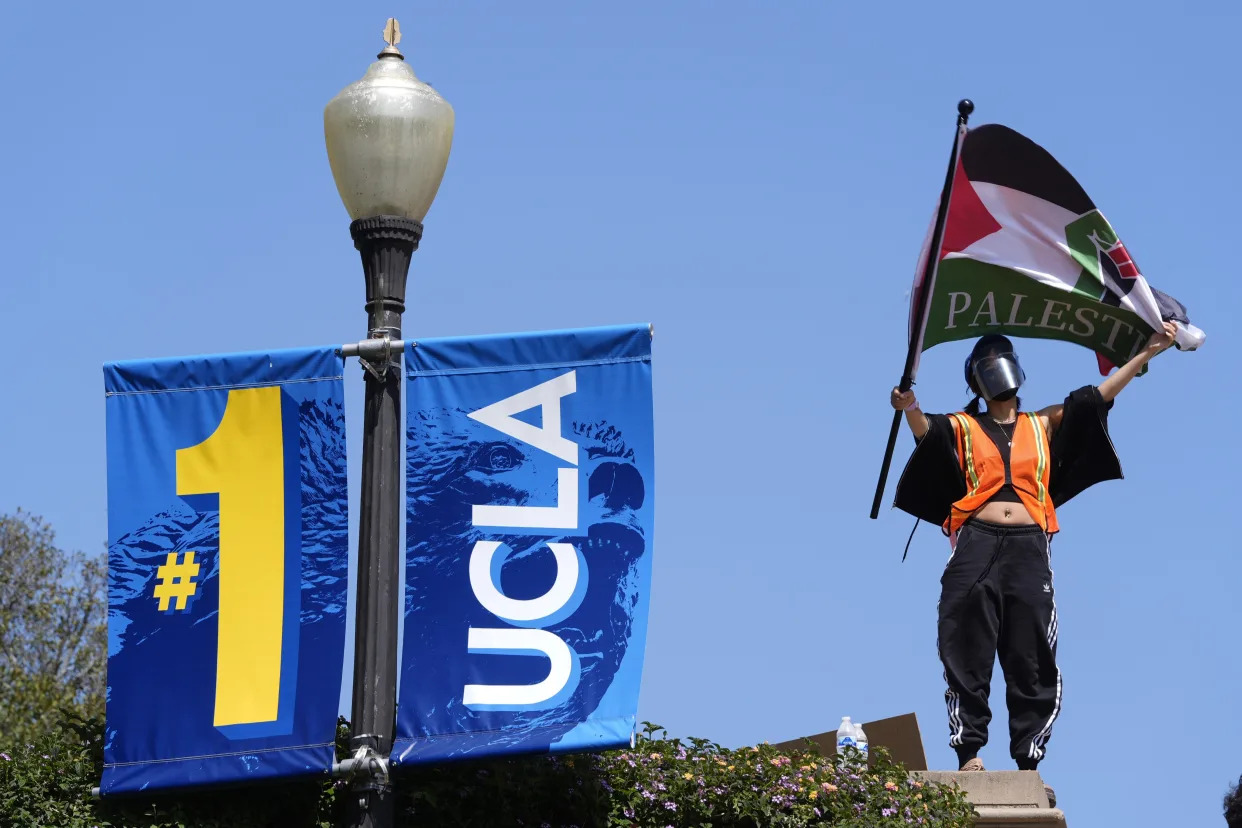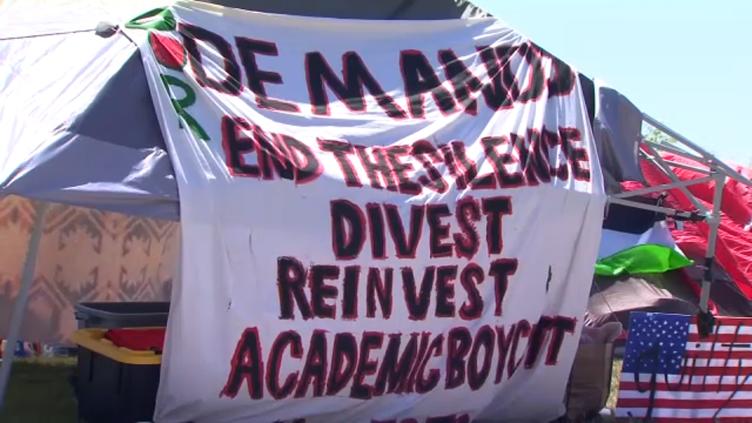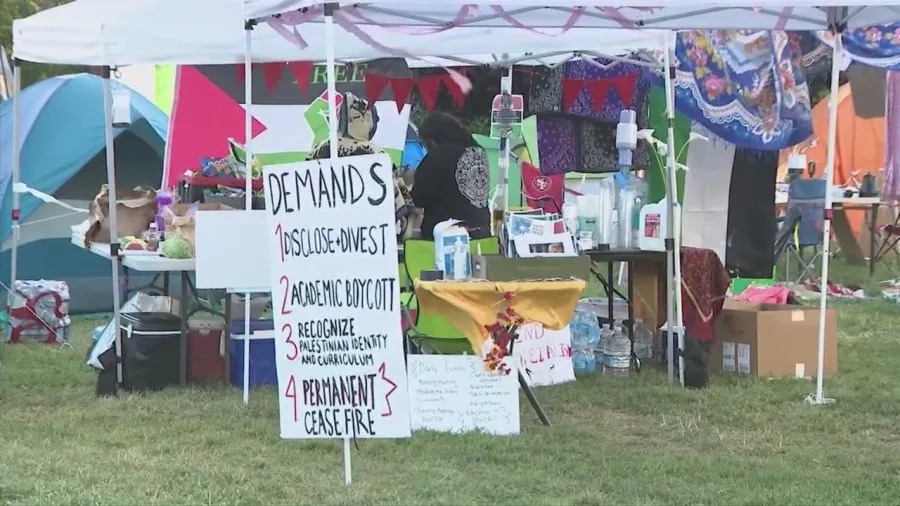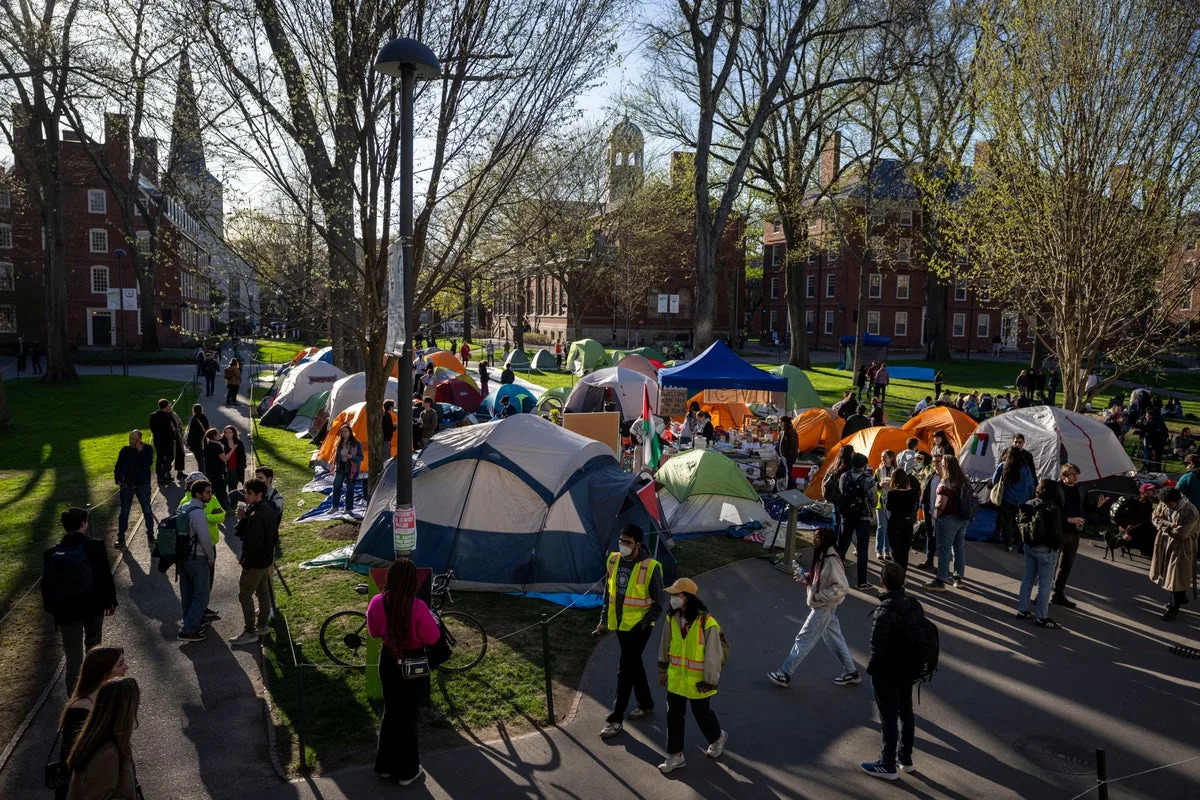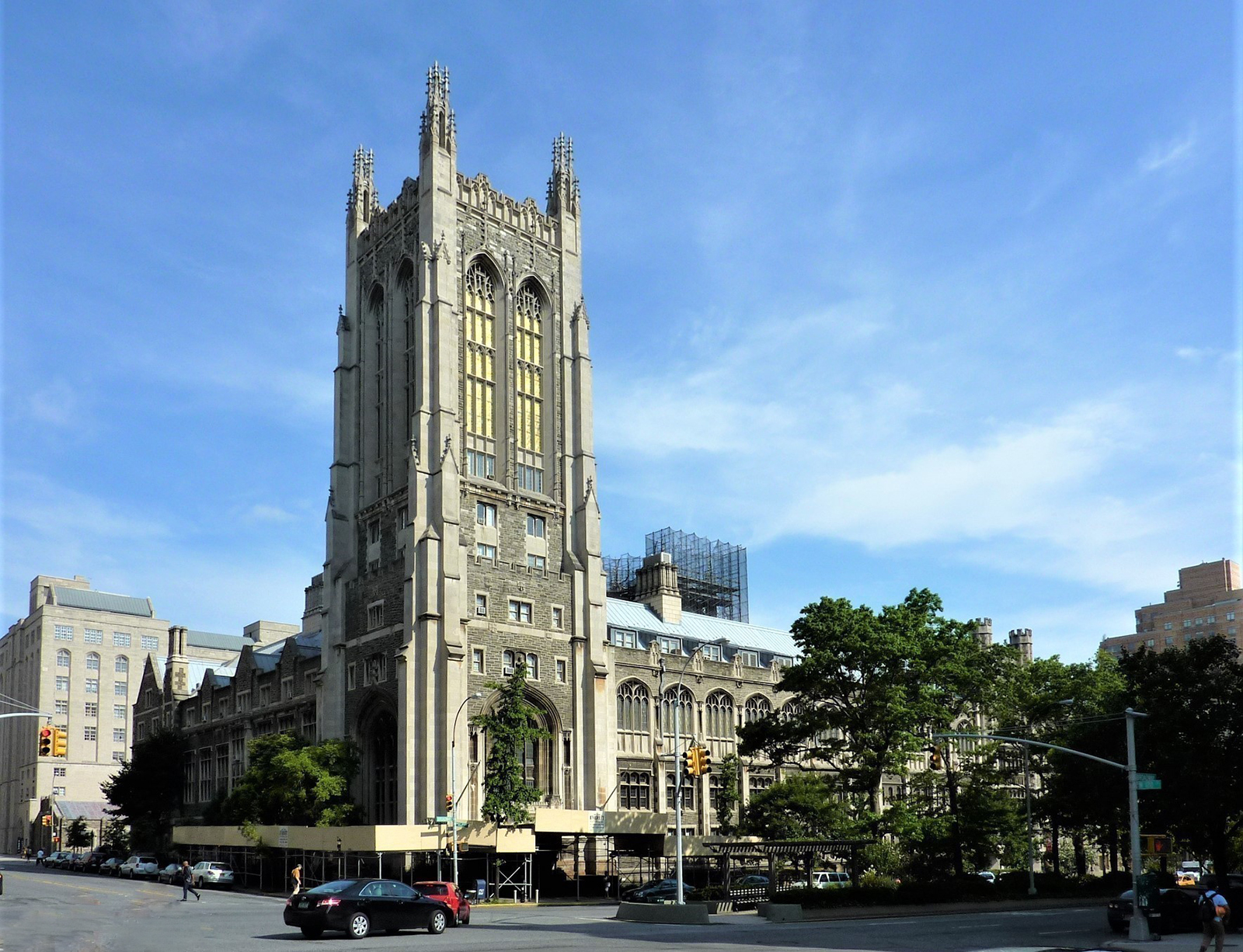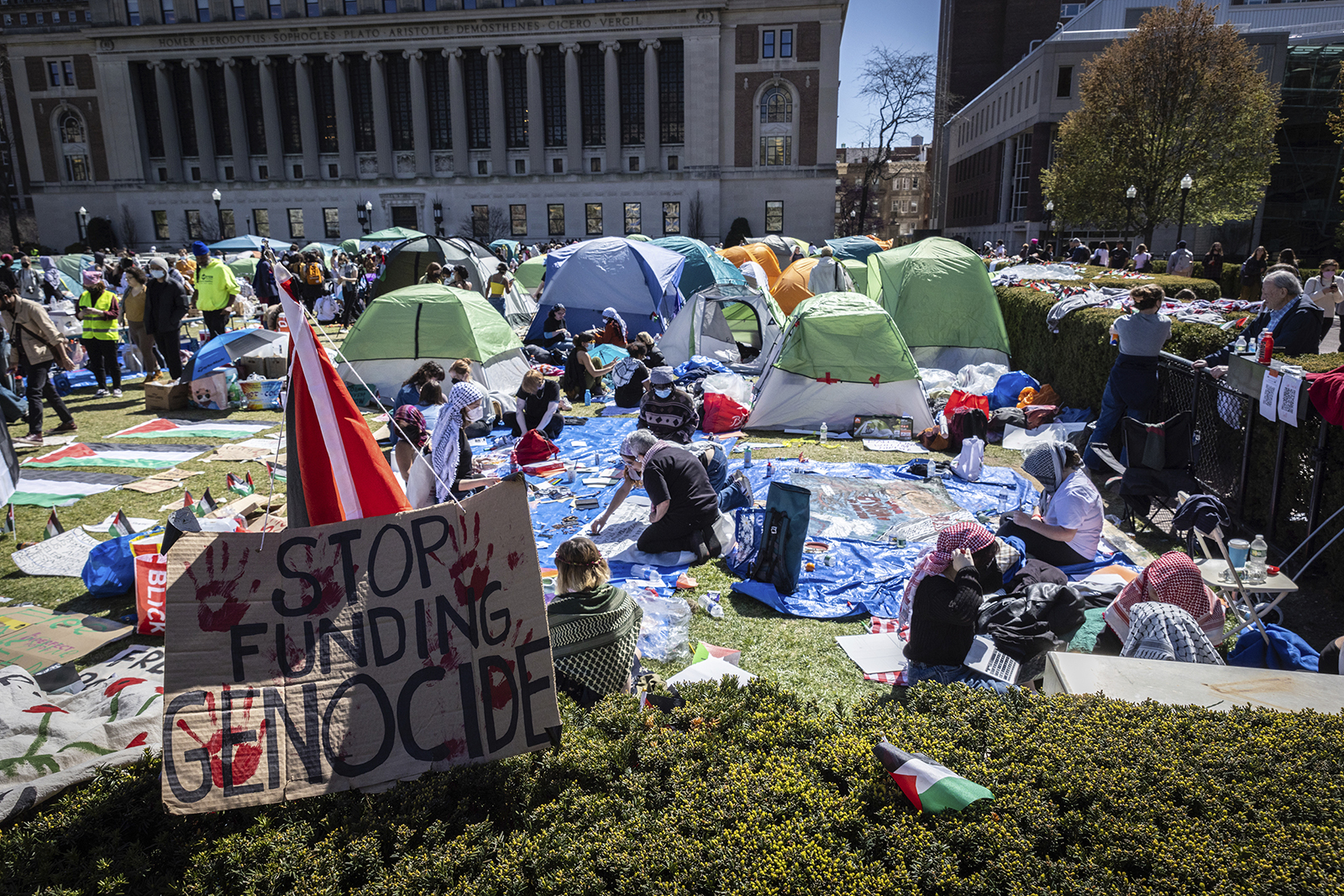A Pew poll shows that when it comes to Israel, American Jews are much closer to white evangelicals than they are to Democratic Party numbers. Democrats want to cut off military aid. By and large, Jews don’t.
BY PHILIP WEISS
MONDOWEISS


BIDEN GIVES SPEECH ON HOLOCAUST MEMORIAL DAY, AT US CAPITOL, MAY 7, 2024. HERE HE IS GREETED BY STU EIZENSTAT, TO HIS IMMEDIATE RIGHT, A STATE DEPARTMENT SPECIAL ADVISER ON HOLOCAUST ISSUES. (PHOTO: JOE BIDEN X ACCOUNT)
Joe Biden took contradictory actions this week. He called campus protesters of Israeli genocide antisemites one day. Then a day later he said he wouldn’t give Israel more bombs to kill Palestinian civilians.
Biden is trying to reconcile two irreconcilable parts of the Democratic coalition– the progressive base and a special interest, the Israel lobby.
Biden’s speech on Holocaust memorial day was an extended attack on the progressives. He said campus protests represent the latest “surge” of the “ancient hatred of Jews,” the same hatred that fueled Nazism
The smear got sympathetic coverage on broadcast media. “This is ultimately a continuation of why he ran in 2020, when he saw neo-Nazis marching in Charlottesville chanting — quote — ‘Jews will not replace us,’” Laura Barron-Lopez said on the PBS News Hour. CNN reporter Jamie Gangel echoed the Charlottesville claim. While CNN anchor Dana Bash said that the protests “hearken back” to Nazi Germany.
Biden’s attack on the demonstrators carries great political risk. The Democratic base is overwhelmingly critical of Israel. By 56 to 22 Democrats say that Israel is committing a “genocide” in Gaza, according to a new poll.
Pew’s survey in March was just as emphatic. Democratic Party voters oppose military aid to Israel by 44 to 25 percent, think that Israel’s methods are unacceptable by 52 to 22 percent, sympathize with Palestinians over Israelis by 27 to 15, think Biden is favoring Israel too much as opposed to striking the right balance by 34 to 29 percent, and have an unfavorable view of Israel’s government by 71 to 24.
Biden has tried to throw some crumbs to that base, as in his decision to hold back some 2000-pound bombs.
But such gestures are too little too late for many progressives– after 34,000 killings and the destruction of Gaza’s cities, all with American weaponry. Bernie Sanders has said that Gaza could prove to be Biden’s Vietnam because of the anger of the base. James Carville has said Biden’s stance could cost him the election.
Pro-Biden apologists in broadcast media have countered by saying that Biden is showing statesmanship by risking his base. And the New York Times has explained Biden’s risktaking by saying he’s a committed Zionist.
What these analyses miss is that Biden knows just what he is doing.
By smearing the protesters, Biden is catering to a key bloc in the Democratic coalition: pro-Israel Jews, who according to Pew are among the most reactionary groups in America on the Israeli violence. Jews historically vote for Democrats by about 3-to 1. But today Jews are completely out of step with the Dem base.
When it comes to Israel, Jews are much closer to white evangelicals and Republicans than they are to the Democratic Party, according to Pew’s poll, conducted in February.
Joe Biden took contradictory actions this week. He called campus protesters of Israeli genocide antisemites one day. Then a day later he said he wouldn’t give Israel more bombs to kill Palestinian civilians.
Biden is trying to reconcile two irreconcilable parts of the Democratic coalition– the progressive base and a special interest, the Israel lobby.
Biden’s speech on Holocaust memorial day was an extended attack on the progressives. He said campus protests represent the latest “surge” of the “ancient hatred of Jews,” the same hatred that fueled Nazism
The smear got sympathetic coverage on broadcast media. “This is ultimately a continuation of why he ran in 2020, when he saw neo-Nazis marching in Charlottesville chanting — quote — ‘Jews will not replace us,’” Laura Barron-Lopez said on the PBS News Hour. CNN reporter Jamie Gangel echoed the Charlottesville claim. While CNN anchor Dana Bash said that the protests “hearken back” to Nazi Germany.
Biden’s attack on the demonstrators carries great political risk. The Democratic base is overwhelmingly critical of Israel. By 56 to 22 Democrats say that Israel is committing a “genocide” in Gaza, according to a new poll.
Pew’s survey in March was just as emphatic. Democratic Party voters oppose military aid to Israel by 44 to 25 percent, think that Israel’s methods are unacceptable by 52 to 22 percent, sympathize with Palestinians over Israelis by 27 to 15, think Biden is favoring Israel too much as opposed to striking the right balance by 34 to 29 percent, and have an unfavorable view of Israel’s government by 71 to 24.
Biden has tried to throw some crumbs to that base, as in his decision to hold back some 2000-pound bombs.
But such gestures are too little too late for many progressives– after 34,000 killings and the destruction of Gaza’s cities, all with American weaponry. Bernie Sanders has said that Gaza could prove to be Biden’s Vietnam because of the anger of the base. James Carville has said Biden’s stance could cost him the election.
Pro-Biden apologists in broadcast media have countered by saying that Biden is showing statesmanship by risking his base. And the New York Times has explained Biden’s risktaking by saying he’s a committed Zionist.
What these analyses miss is that Biden knows just what he is doing.
By smearing the protesters, Biden is catering to a key bloc in the Democratic coalition: pro-Israel Jews, who according to Pew are among the most reactionary groups in America on the Israeli violence. Jews historically vote for Democrats by about 3-to 1. But today Jews are completely out of step with the Dem base.
When it comes to Israel, Jews are much closer to white evangelicals and Republicans than they are to the Democratic Party, according to Pew’s poll, conducted in February.
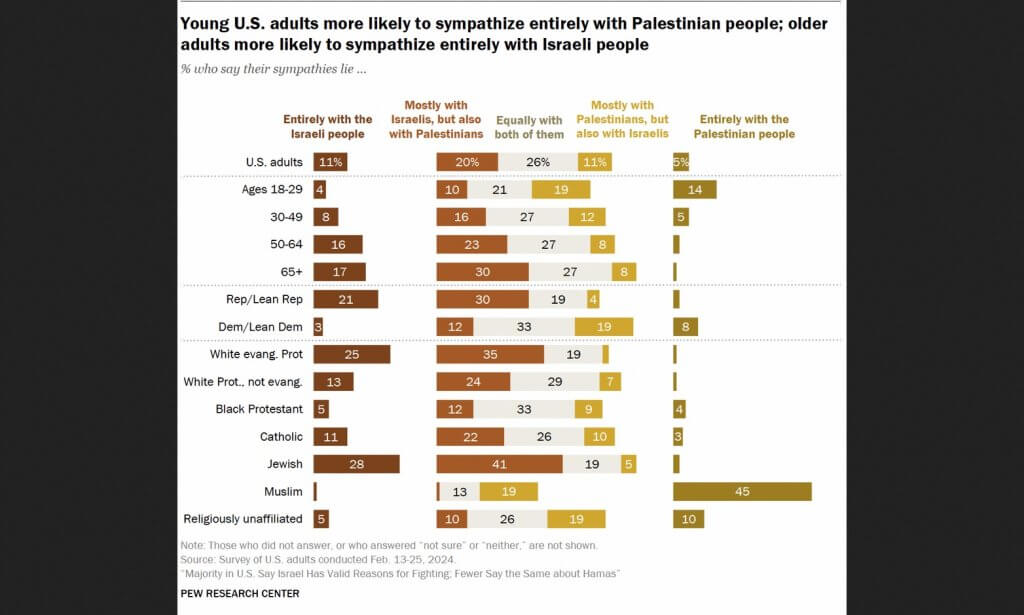 PEW POLL IN MARCH SHOWS THAT JEWISH SYMPATHY FOR ISRAELIS OVER PALESTINIANS IS OVERWHELMING, AT 69 TO 7 PERCENT, AND GREATER THAN WHITE EVANGELICAL PROTESTANTS’ SYMPATHY FOR ISRAEL, AND STARKLY AT ODDS WITH DEMOCRATIC PARTY VOTERS, WHO SYMPATHIZE WITH PALESTINIANS OVER ISRAELIS BY 27 TO 15.
PEW POLL IN MARCH SHOWS THAT JEWISH SYMPATHY FOR ISRAELIS OVER PALESTINIANS IS OVERWHELMING, AT 69 TO 7 PERCENT, AND GREATER THAN WHITE EVANGELICAL PROTESTANTS’ SYMPATHY FOR ISRAEL, AND STARKLY AT ODDS WITH DEMOCRATIC PARTY VOTERS, WHO SYMPATHIZE WITH PALESTINIANS OVER ISRAELIS BY 27 TO 15.By 62 to 33 percent, Jews find Israel’s methods acceptable; sympathize with Israelis by 69 to 7 (sympathy for Palestinians); support military aid by 74 to 15; think Biden is striking the right balance as opposed to being too favorable to Israel, by 45 to 13; and have a favorable view of Israel’s government by 54 to 44.
Nearly one in five Jews say that Biden is too favorable to Palestinians. Only 3 percent of Democrats say that
.

PEW POLL IN MARCH SHOWS THAT DEMOCRATIC PARTY VOTERS OPPOSE MILITARY AID TO ISRAEL BY 44 TO 25 PERCENT, WHILE JEWS SUPPORT AID TO ISRAEL BY 74 TO 15 AGAINST.
These ardently pro-Israel views can be seen in the many ways that American Jews have risen to support Israel since the war began October 7. For instance, the five leading Jewish organizations (ADL, AIPAC, AJC, Conference of Presidents, and Federations) formed a new publicity campaign, led by a p.r. firm with links to the Biden administration, saying much what Biden said in his Holocaust speech: October 7 was an unleashing of Jewish hatred that hasn’t stopped since. Donor activism by Jewish pro-Israel alumni at Harvard and Penn led to the historic resignations of the Harvard and Penn presidents, days after they did not sufficiently denounce pro-Palestine demonstrators in congressional testimony –a demonstration of Zionist muscle if ever there was one.
Such efforts continue with Harvard megadonor Bill Ackman and Jessica Seinfeld, the wife of Jerry Seinfeld, funding pro-Israel demonstrations, and former Facebook exec Sheryl Sandberg putting out a documentary about sexual violence on October 7.
In fact, the leading Jewish organizations have been cheerleaders for an onslaught that many international law experts say is a genocide. Just the other day Jonathan Greenblatt of the ADL issued a battle cry for Netanyahu’s war on the starving refugees of Rafah.
“We are not the Jews of trembling knees. We will not flee, we will fight, we will press on and we will win, because we have no other choice,” Greenblatt said.
Biden’s pandering to these reactionary forces is in a tradition of Democratic politicians currying the favor of Zionist donors. The proportion of large Jewish donors in the Democratic Party is “gigantic” and “shocking,” according to J Street experts in 2016, the “elephant in the room” according to the Pulitzer Prize winner Nathan Thrall, writing in the Times in 2019. And former insiders Ben Rhodes of the Obama administration and Stu Eizenstat of the Carter administration (who introduced Biden’s Holocaust remembrance speech) have both written that Jewish donors were critical to their presidents’ reelection success/failure.
Of course, calling out these Jewish influencers can foster antisemitism: it bolsters the view that all Jews are powerful and working behind the scenes to get politicians to overlook the crimes of the Jewish state.
That makes it more important than ever to stress that a third of the Jewish community does not buy into the pro-Israel propaganda. A third of the community is very similar to the Democratic base and to younger voters generally. A strong but growing minority of the Jewish community is non- or anti-Zionist, and already causing a crisis among liberal Zionists, and a boycott of some Passover seders, and uncomfortable silence at others.
These Jews are shut out of the establishment but unapologetically critical of Israel’s conduct. The youth group IfNotNow has denounced Israeli genocide and apartheid, and been ostracized from the mainstream Jewish community for doing so.
When Biden withheld bombs from the Israeli military machine, Jewish Voice for Peace declared, “This is huge, and now is the time to tip the scales.”
For all of Jonathan Greenblatt’s and Alan Dershowitz’s warmongering, media need to focus on such Jewish leaders as Norman Finkelstein. The 70-year-old son of Holocaust survivors, Finkelstein has for 40 years created a body of work of harsh criticism of the Jewish state that he continues to this day. He will one day be lauded as a Jewish hero. As will Rebecca Vilkomerson of Jewish Voice for Peace, Simone Zimmerman of IfNotNow, and Marc Ellis, the author and liberation theologian.
The Jewish establishment has long shunned such speakers as self-haters as it exerts its influence for Israel. Those organizations still have traction in the White House, but not among young Jews who question Zionism. The youthful numbers are only growing. The media have an obligation to give these Jews a voice. Then our politicians will also salute their work.
These ardently pro-Israel views can be seen in the many ways that American Jews have risen to support Israel since the war began October 7. For instance, the five leading Jewish organizations (ADL, AIPAC, AJC, Conference of Presidents, and Federations) formed a new publicity campaign, led by a p.r. firm with links to the Biden administration, saying much what Biden said in his Holocaust speech: October 7 was an unleashing of Jewish hatred that hasn’t stopped since. Donor activism by Jewish pro-Israel alumni at Harvard and Penn led to the historic resignations of the Harvard and Penn presidents, days after they did not sufficiently denounce pro-Palestine demonstrators in congressional testimony –a demonstration of Zionist muscle if ever there was one.
Such efforts continue with Harvard megadonor Bill Ackman and Jessica Seinfeld, the wife of Jerry Seinfeld, funding pro-Israel demonstrations, and former Facebook exec Sheryl Sandberg putting out a documentary about sexual violence on October 7.
In fact, the leading Jewish organizations have been cheerleaders for an onslaught that many international law experts say is a genocide. Just the other day Jonathan Greenblatt of the ADL issued a battle cry for Netanyahu’s war on the starving refugees of Rafah.
“We are not the Jews of trembling knees. We will not flee, we will fight, we will press on and we will win, because we have no other choice,” Greenblatt said.
Biden’s pandering to these reactionary forces is in a tradition of Democratic politicians currying the favor of Zionist donors. The proportion of large Jewish donors in the Democratic Party is “gigantic” and “shocking,” according to J Street experts in 2016, the “elephant in the room” according to the Pulitzer Prize winner Nathan Thrall, writing in the Times in 2019. And former insiders Ben Rhodes of the Obama administration and Stu Eizenstat of the Carter administration (who introduced Biden’s Holocaust remembrance speech) have both written that Jewish donors were critical to their presidents’ reelection success/failure.
Of course, calling out these Jewish influencers can foster antisemitism: it bolsters the view that all Jews are powerful and working behind the scenes to get politicians to overlook the crimes of the Jewish state.
That makes it more important than ever to stress that a third of the Jewish community does not buy into the pro-Israel propaganda. A third of the community is very similar to the Democratic base and to younger voters generally. A strong but growing minority of the Jewish community is non- or anti-Zionist, and already causing a crisis among liberal Zionists, and a boycott of some Passover seders, and uncomfortable silence at others.
These Jews are shut out of the establishment but unapologetically critical of Israel’s conduct. The youth group IfNotNow has denounced Israeli genocide and apartheid, and been ostracized from the mainstream Jewish community for doing so.
When Biden withheld bombs from the Israeli military machine, Jewish Voice for Peace declared, “This is huge, and now is the time to tip the scales.”
For all of Jonathan Greenblatt’s and Alan Dershowitz’s warmongering, media need to focus on such Jewish leaders as Norman Finkelstein. The 70-year-old son of Holocaust survivors, Finkelstein has for 40 years created a body of work of harsh criticism of the Jewish state that he continues to this day. He will one day be lauded as a Jewish hero. As will Rebecca Vilkomerson of Jewish Voice for Peace, Simone Zimmerman of IfNotNow, and Marc Ellis, the author and liberation theologian.
The Jewish establishment has long shunned such speakers as self-haters as it exerts its influence for Israel. Those organizations still have traction in the White House, but not among young Jews who question Zionism. The youthful numbers are only growing. The media have an obligation to give these Jews a voice. Then our politicians will also salute their work.
